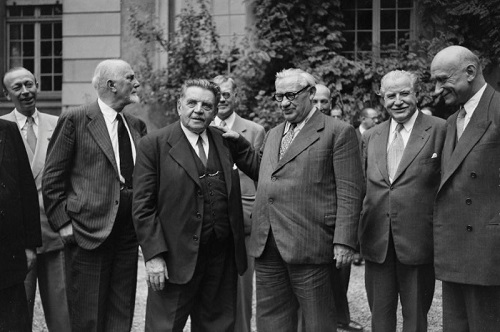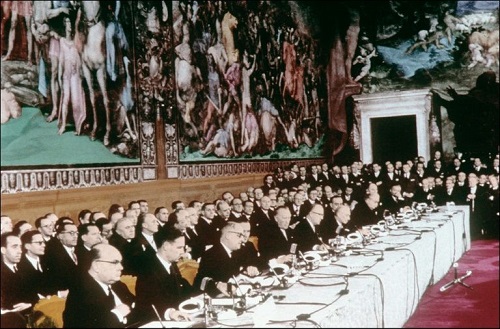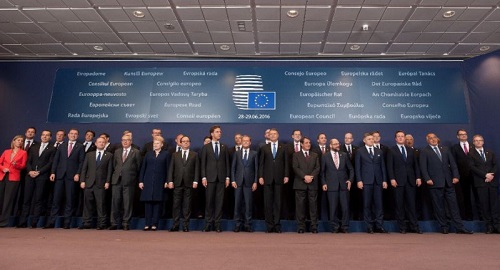With all
the attention focused on the NSA, Europeans all too often ignore the threat in
their midst: Britain’s surveillance apparatus, argues Thorsten Benner.
On the face
of it, at their summit last week in Brussels, EU leaders presented a united
front of controlled outrage against the revelations that the NSA had not just
collected the data of millions of ordinary citizens but also spied on German
chancellor Angela Merkel and French president Francois Hollande.
In the past
week, all European attention was focused on what President Barack Obama knew or
didn't know about the spying activities and what this means for the future of
transatlantic relations. Jan Philipp Albrecht, a member of the European
Parliament and leading critic of surveillance, points to a "culturegap" on privacy between the Europe and the United States.
Such loose
talk suffers from a major blind spot: There is no united Europe when it comes
to surveillance. A chief enemy of privacy rights is part of the European Union:
the government of the United Kingdom. Britain is the second most important
member of the "Five Eyes" global spying alliance that in addition to
the US includes Australia, Canada and New Zealand. Britain runs a massive
surveillance apparatus affecting millions of citizens around Europe and the
world through taps on fiber-optic cables, weakening of encryption, and
compelling of Internet service providers to provide user data to the
authorities.
UK bigger
challenge than US
As the
Snowden documents reveal, the NSA even pays the UK to operate as the European
hub for surveillance. The fight for digital privacy rights will not be won
unless Europe starts to confront the crucial challenge within its own borders.
And in a number of ways, advocates against mass surveillance face an even
tougher environment in the UK than in the US.
 |
| Thorsten Benner |
First,
politically there is little momentum against surveillance in the UK. Whereas in
the US you have an emerging anti-surveillance alliance composed of left-wing
civil rights defenders, libertarians and digital companies worried about their
reputation and profits, there is nothing like that in Britain. Second, in terms
of safeguards and oversight the UK is has a very feeble regime. The GCHQ seems
to use the weak regulatory environment in the UK as a selling point in order to
attract US funding for surveillance.
As a recent
study points out in the UK "the authorization and the review process are
entirely contained within the executive branch". There does not seem to be
any judicial review of surveillance powers and activities by UK courts under
the terrorism act. Parliament is not much more effective either. According to
Liberal Democrat MP Julian Huppert, the GCHQ has "almost completely free
rein". The committee that is supposed to scrutinize the intelligence services
"consists of a small number of parliamentarians, handpicked by the prime
minister, and includes ex-ministers who effectively scrutinize their own past
decisions. It is not clear (…) they all understand the technical capabilities
they are supposed to comment on."
Lackluster
media
Third, the
UK's news media are in a weak position. Part of it seems self-inflicted. The
BBC's reporting on the UK surveillance activities has been rather lackluster
and no match for aspirations of the institution that prides itself on being the
world's most trusted news source. Part of this weakness is due to government
interference and the lack of constitutional protections for press freedom.
The
Guardian, the world's leading source of reporting on surveillance, has found
itself at the receiving end of government intimidation that includes the forced
destruction of a laptop with the Snowden material under the supervision of
senior government officials. Just this week David Cameron issued another threat
to the media to voluntarily stop reporting on the Snowden files or face
"injunctions or D-notices (publication bans) or the other tougher
measures". Cameron used language that one would expect to hear from
Russian President Vladimir Putin but not from the prime minister of one of the
world's oldest and proudest democracies.
Parliament's
duty
Anyone in
Europe concerned about the right to privacy in the digital age needs to work
through multiple channels to try to turn the tide in the UK. First, work with
the UK parliament. The fact that today Liberal Democrat MP Julian Huppert will
lead a debate on the question of oversight of intelligence and security
services is a welcome first sign of hope that the UK parliament starts to live
up to its responsibilities. The goal should be to convince the British
parliament to push in favor of a EU agreement that affords all European
citizens the same protections that are afforded to national citizens when it
comes to the work of intelligence services.
Second,
European NGOs, companies and governments should strive to build coalitions that
help to delegitimize the UK (and by extension US) mass surveillance activities
as violating fundamental rights to privacy enshrined in both existing EU and
international law. The recent German-Brazilian initiative at the UN General
Assembly is one step in the right direction.
Legal
campaign
Third,
challenge British surveillance activities in court. The watchdog group Privacy
International has tried that but was forced to file the suit with a secret
tribunal rather than a regular administrative court. That is why the recent
initiative by rights groups to launch a legal challenge against the UK before
the European Court of Human Rights is an overdue step. In addition, the
European Commission should consider suing Britain for violating European norms
on privacy protection.
At the same
time, rights advocates should counter any efforts to enter bilateral deals with
the US or the UK on the cheap. The Bertelsmann Foundation's Annette Heuser for
example has argued that Germany should apply to enter the "Five Eyes"
global spying alliance hinting at Germany's "crucial intelligence" on
Iran and Syria as a dowry. Such a step would only serve to legitimize and
strengthen the mass surveillance practice of the UK and US.
Rather
foundations (not least those associated with media companies) should invest in
research and advocacy on protecting rights of citizens against surveillance.
This will be an uphill battle at best given that there are many advocates of
surveillance in governments across Europe (including Germany). But this will be
the only way to tackle the problem at its root.
Thorsten
Benner (@thorstenbenner) is director of the Global Public Policy Institute
(GPPi) in Berlin.
Related Article:












No comments:
Post a Comment
Note: Only a member of this blog may post a comment.